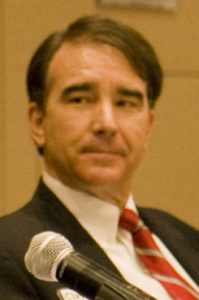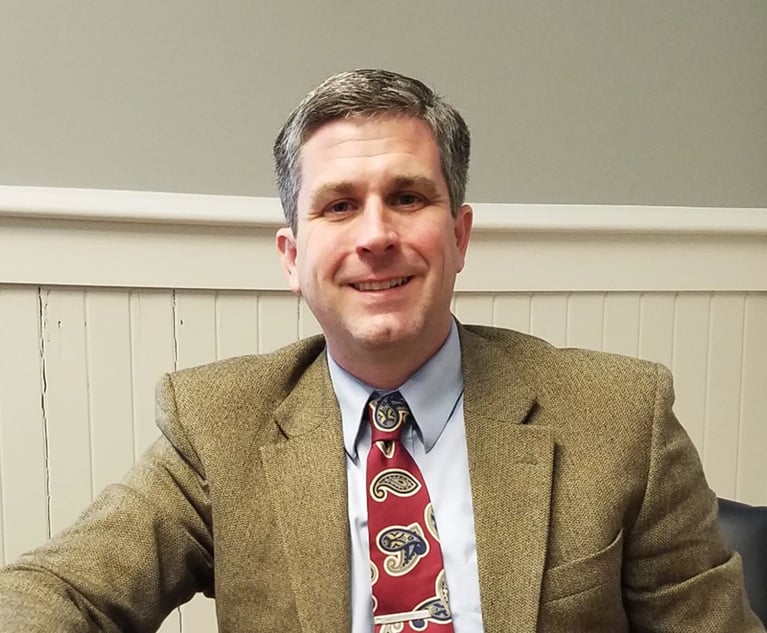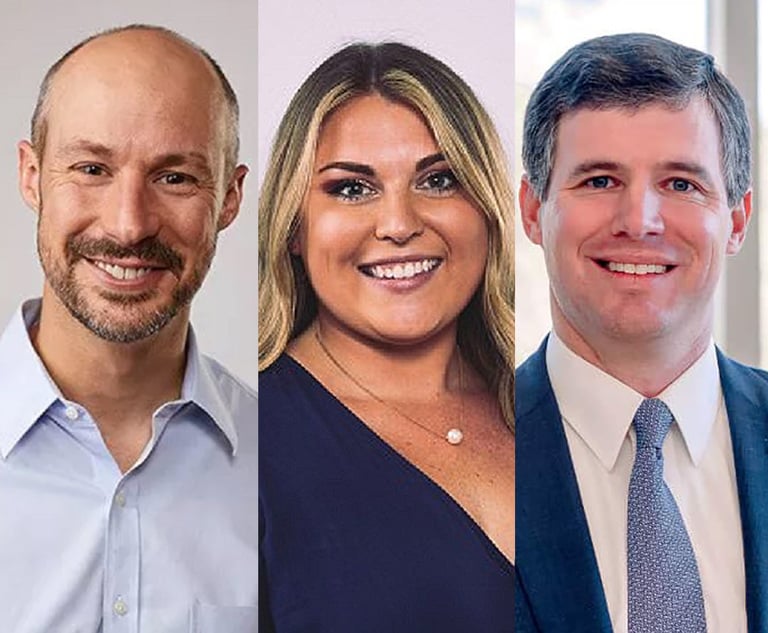Eli Lilly GC Quotes Georgia Judge in Criticism of Multidistrict Litigation
Many of the lawsuits prominent in today's headlines—the ones concerning opioids, talc, NFL concussions and many pharmaceutical products—are part of a 50-year-old experiment in legal procedure known as multidistrict litigation whose vital signs are now flashing an immediate need for intensive care.
February 21, 2019 at 12:55 PM
6 minute read
The original version of this story was published on Corporate Counsel

Many of the lawsuits prominent in today's headlines—the ones concerning opioids, talc, NFL concussions and many pharmaceutical products—are part of a 50-year-old experiment in legal procedure known as multidistrict litigation whose vital signs are now flashing an immediate need for intensive care.
Multidistrict litigation was created by Congress in 1968 to facilitate “consolidation for pretrial purposes” when multiple cases concerning the same issues were filed in different courts around the country. It was, and still remains, a worthy goal to provide efficiency and uniformity in the management of discovery and other pretrial matters in such cases before sending them back for trial in the courts where they were filed.
Lawsuits consolidated into MDL cases now constitute about 47 percent of the federal civil docket. This trend is accelerating; the number of such cases has tripled in the last 15 years. So has the size of cases—24 current MDLs have over 1,000 plaintiffs each, and the largest have well over 10,000.
As general counsel of Eli Lilly and Co., I have participated in a number of MDLs over the years and have had both positive and negative experiences with the process. Increasingly, however, as MDLs have become less and less tethered to widely accepted principles of procedural fairness, I am finding it much more difficult to support MDL consolidation. The reasons should be alarming to anyone concerned about the rule of law.
Many MDLs today—particularly those in the products liability category—are defined by a lack of clear, fair and predictable procedural rules. This should be startling to American lawyers because, since 1938, litigation procedure in U.S. courts has been generally well defined by the Federal Rules of Civil Procedure (FRCP), which are firmly established and widely accepted as providing the structure of litigation and the necessary protections to the parties.
Because of the FRCP, any lawyer in a federal court knows a great deal about how their case will proceed, including what kind of discovery information they can request from the other side, what types of motions will be allowed and what standards the court will apply to ensure compliance with the rules. But MDL cases are often quite different. Despite Rule 1's admonition that the FRCP govern “all civil actions and proceedings,” it is well known that a perceived “MDL exception” to the FRCP means these cases are often subject to ad hoc administrative instructions that are frequently one-sided.
In many instances, it is understandable that MDL judges deviate from the FRCP because some of its key provisions are impractical or impossible to apply in cases with thousands of plaintiffs. Fortunately, the Civil Rules Advisory Committee, which is responsible to ensure the integrity and functionality of the FRCP, is undertaking a thorough examination of MDL practices with an eye toward the possibility of amending the FRCP. I am optimistic they will take the much-needed action to save the patient.
Three of the most important reforms before the committee concern the early vetting of claims, appellate review of key rulings and required disclosure of nonparties to litigation who obtain financial interests in litigation whose value is contingent upon the outcome.
 Judge Clay Land. (Courtesy photo.)
Judge Clay Land. (Courtesy photo.)Early vetting of claims is critical to the integrity of judicial process. The FRCP contain standards and procedures for testing the validity of claims before trial because it is unjust and inefficient to allow meritless claims to languish and clog court dockets. Unfortunately, the failure to adapt those rules to MDL cases is causing an overwhelming crush of meritless claims—perhaps 30 to 40 percent, or even higher. The large number of meritless claims distorts perceptions of the value and complexity of MDL cases, hindering resolution, and results in an “if you build it they will come” phenomenon in which a large number of claims draws even more pile-on filings by lawyers hoping for a settlement regardless of the merits. Judge Clay Land, who serves on the federal bench in Georgia, put it like this: “the evolution of the MDL process toward providing an alternative dispute resolution forum for global settlements has produced incentives for the filing of cases that otherwise would not be filed if they had to stand on their own merit as a stand-alone action.”
Appellate review is almost nonexistent in MDL cases despite the fact that a single ruling by one judge can affect thousands of plaintiffs whose rights are at stake and cause an enormous economic consequence to defendants. Amending the FRCP to allow appeals of key motions would serve the same fundamental purpose in MDL cases as in other cases: ensuring a just and consistent result, giving parties confidence that the issues have been fully heard, and providing guidance to future parties and courts. It would also facilitate timely case resolution in many instances by delivering a final answer on disputed issues before enormous time and resources are spent on trials.
Finally, it is very important for the FRCP to require disclosure of non-parties to lawsuits who make investments in litigation in exchange for a return that is contingent on the outcome. Third-party litigation funding is skyrocketing, and it inherently raises questions that courts and parties need to understand. Everyone involved in litigation needs to know who is “in the courtroom” for reasons including compliance with ethical obligations, administering rules and sanctions appropriately and fairness in understanding settlement dynamics. Disclosure should be required in all cases, not just MDLs, even though the massive infusions of third-party funds is most notable in MDL cases right now. No doubt, anyone unlucky enough to find themselves sued by a neighbor would have a keen interested in knowing whether a hedge fund is footing the bill and expecting a healthy return on investment.
These reforms, along with a handful of additional ideas that the Civil Rules Advisory Committee is considering, should be written into the FRCP so they are accessible and transparent to all stakeholders in litigation. Doing so would deliver the intensive care that the MDL process needs in order to live into the future.
Michael J. Harrington is senior vice president and general counsel for Eli Lilly and Co. He serves on the boards of the National Center for State Courts and Leadership Council for Legal Diversity, and is a member of Lawyers for Civil Justice.
This content has been archived. It is available through our partners, LexisNexis® and Bloomberg Law.
To view this content, please continue to their sites.
Not a Lexis Subscriber?
Subscribe Now
Not a Bloomberg Law Subscriber?
Subscribe Now
NOT FOR REPRINT
© 2025 ALM Global, LLC, All Rights Reserved. Request academic re-use from www.copyright.com. All other uses, submit a request to [email protected]. For more information visit Asset & Logo Licensing.
You Might Like
View All

DC Lawsuits Seek to Prevent Mass Firings and Public Naming of FBI Agents
3 minute read

Apply Now: Superior Court Judge Sought for Mountain Judicial Circuit Bench
3 minute readTrending Stories
- 1Trump's DOJ Delays Releasing Jan. 6 FBI Agents List Under Consent Order
- 2Securities Report Says That 2024 Settlements Passed a Total of $5.2B
- 3'Intrusive' Parental Supervision Orders Are Illegal, NY Appeals Court Says
- 4Federal Laws Also Preempt State's Swipe Fee Law on Out-of-State Banks, Judge Rules
- 5Judge Grills DOJ on Trump’s Birthright Citizenship Executive Order
Who Got The Work
J. Brugh Lower of Gibbons has entered an appearance for industrial equipment supplier Devco Corporation in a pending trademark infringement lawsuit. The suit, accusing the defendant of selling knock-off Graco products, was filed Dec. 18 in New Jersey District Court by Rivkin Radler on behalf of Graco Inc. and Graco Minnesota. The case, assigned to U.S. District Judge Zahid N. Quraishi, is 3:24-cv-11294, Graco Inc. et al v. Devco Corporation.
Who Got The Work
Rebecca Maller-Stein and Kent A. Yalowitz of Arnold & Porter Kaye Scholer have entered their appearances for Hanaco Venture Capital and its executives, Lior Prosor and David Frankel, in a pending securities lawsuit. The action, filed on Dec. 24 in New York Southern District Court by Zell, Aron & Co. on behalf of Goldeneye Advisors, accuses the defendants of negligently and fraudulently managing the plaintiff's $1 million investment. The case, assigned to U.S. District Judge Vernon S. Broderick, is 1:24-cv-09918, Goldeneye Advisors, LLC v. Hanaco Venture Capital, Ltd. et al.
Who Got The Work
Attorneys from A&O Shearman has stepped in as defense counsel for Toronto-Dominion Bank and other defendants in a pending securities class action. The suit, filed Dec. 11 in New York Southern District Court by Bleichmar Fonti & Auld, accuses the defendants of concealing the bank's 'pervasive' deficiencies in regards to its compliance with the Bank Secrecy Act and the quality of its anti-money laundering controls. The case, assigned to U.S. District Judge Arun Subramanian, is 1:24-cv-09445, Gonzalez v. The Toronto-Dominion Bank et al.
Who Got The Work
Crown Castle International, a Pennsylvania company providing shared communications infrastructure, has turned to Luke D. Wolf of Gordon Rees Scully Mansukhani to fend off a pending breach-of-contract lawsuit. The court action, filed Nov. 25 in Michigan Eastern District Court by Hooper Hathaway PC on behalf of The Town Residences LLC, accuses Crown Castle of failing to transfer approximately $30,000 in utility payments from T-Mobile in breach of a roof-top lease and assignment agreement. The case, assigned to U.S. District Judge Susan K. Declercq, is 2:24-cv-13131, The Town Residences LLC v. T-Mobile US, Inc. et al.
Who Got The Work
Wilfred P. Coronato and Daniel M. Schwartz of McCarter & English have stepped in as defense counsel to Electrolux Home Products Inc. in a pending product liability lawsuit. The court action, filed Nov. 26 in New York Eastern District Court by Poulos Lopiccolo PC and Nagel Rice LLP on behalf of David Stern, alleges that the defendant's refrigerators’ drawers and shelving repeatedly break and fall apart within months after purchase. The case, assigned to U.S. District Judge Joan M. Azrack, is 2:24-cv-08204, Stern v. Electrolux Home Products, Inc.
Featured Firms
Law Offices of Gary Martin Hays & Associates, P.C.
(470) 294-1674
Law Offices of Mark E. Salomone
(857) 444-6468
Smith & Hassler
(713) 739-1250






